Paladin’s Welcome
Once Cecil returns to Mysidia as a shiny new Paladin, everyone treats him much more nicely:
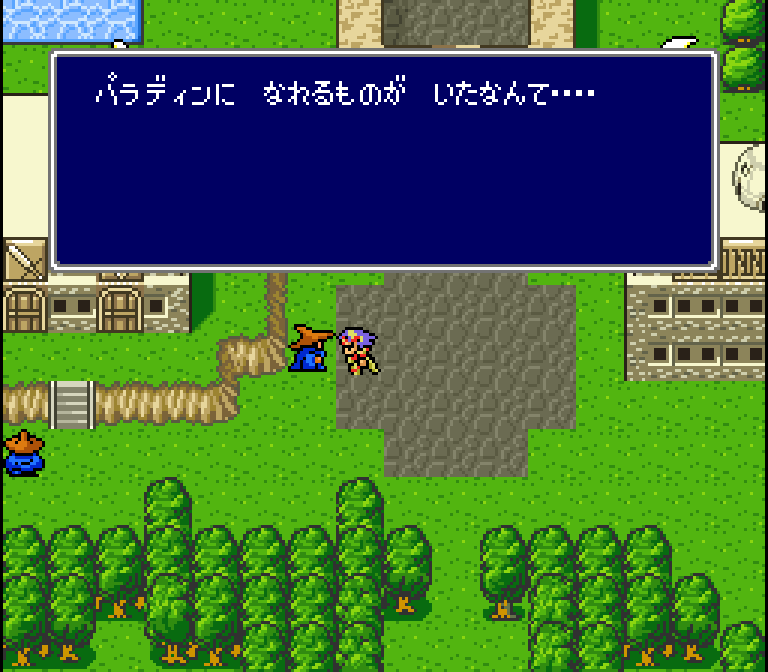 |  |
| Final Fantasy IV (Super Famicom) | Final Fantasy II (Super NES) |
This black wizard says in Japanese: “I can’t believe there was someone capable of becoming a Paladin…”
In the English translation, this became: “You sure became a Paladin!”
Surprised Wizard
Remember the white wizard in Mysidia that jumps away because Cecil’s a scary Dark Knight? Well, here’s how he/she responds once he’s a Paladin:
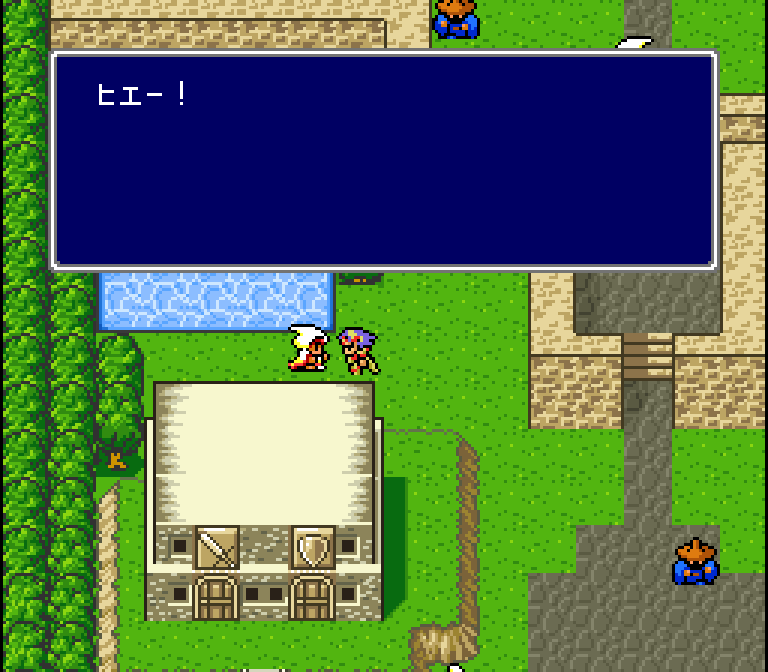 | 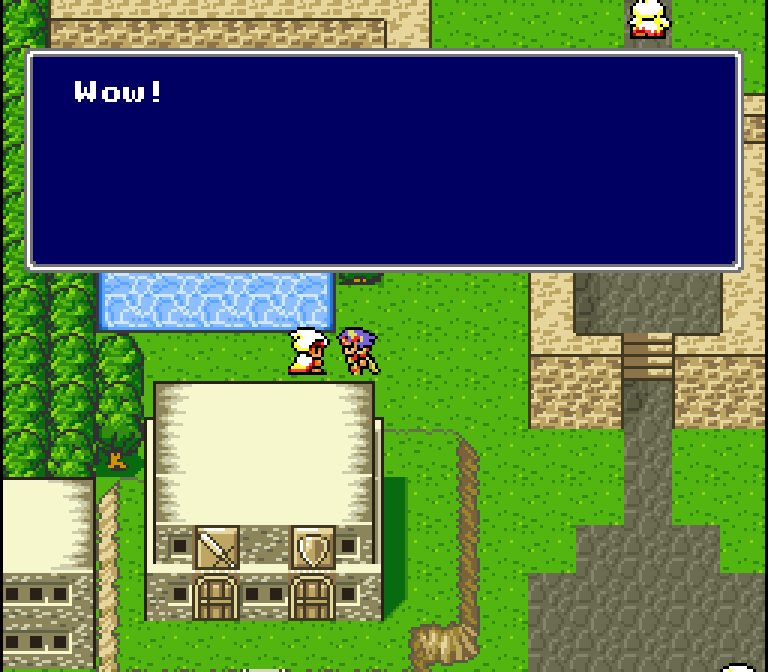 |
| Final Fantasy IV (Super Famicom) | Final Fantasy II (Super NES) |
| Japanese Version (basic translation) | English Version |
| Yikes! | Wow! |
| Your appearance! | This is the… |
| A Paladin? | Paladin? |
| Yikes! What a shock! | What a surprise! |
Again, the English version shows amazement where it’s more like shock in the original text. Although the translation does hit the mark closer this time around since he expresses surprise at the end there in both versions.
Sympathetic Wizard
This white wizard now sympathizes with Cecil:
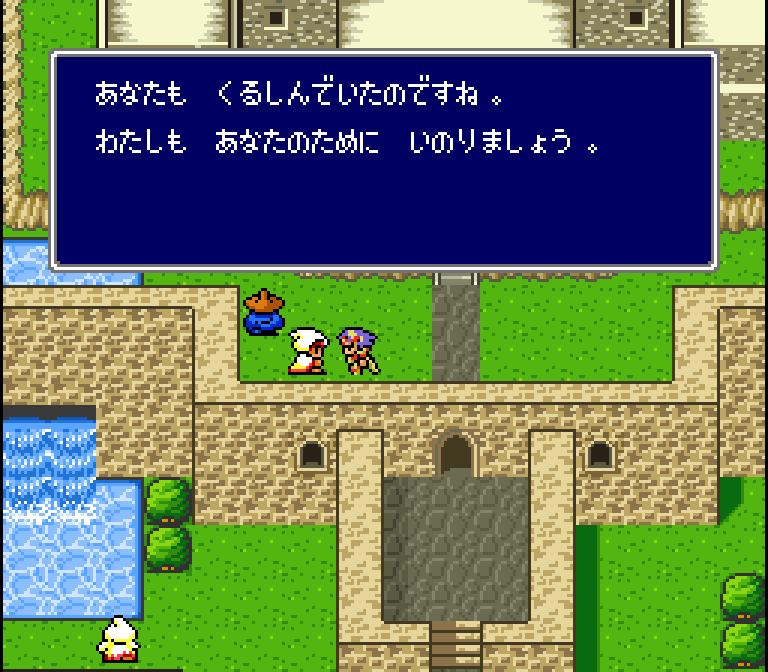 | 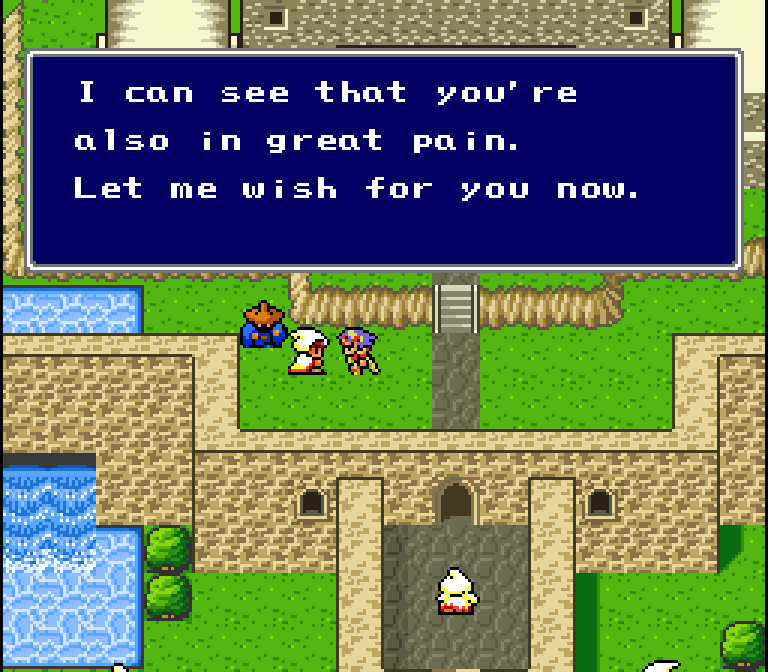 |
| Final Fantasy IV (Super Famicom) | Final Fantasy II (Super NES) |
| Japanese Version (basic translation) | English Version |
| You were suffering too, I see. I will pray for your sake as well. | I can see that you’re also in great pain. Let me wish for you now. |
There’s a slight nuance difference here – in Japanese, the wizard points out that although Cecil had been a Dark Knight before, he had pain of his own that he was bearing. And only after the Paladin transformation was he released from it.
But in the English translation, it makes it sound like he’s in pain now. Which I suppose might still be the case because Rosa was taken and all that, but that doesn’t seem to be the actual intention behind this line.
Also, we see another of the good ol’ changes from praying to wishing here.
Surprised Bartender
 | 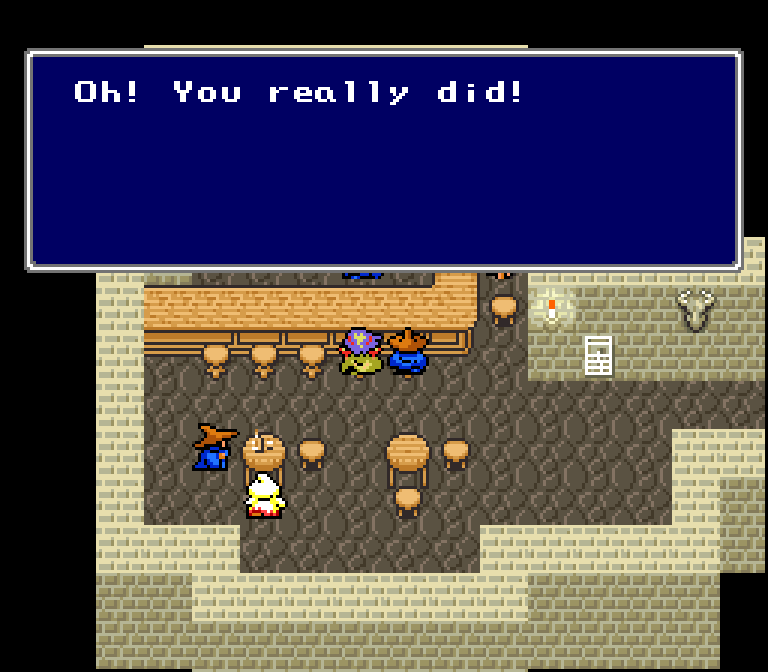 |
| Final Fantasy IV (Super Famicom) | Final Fantasy II (Super NES) |
The bartender in the Mysidian bar says in Japanese: “My word! You really did it!” In Japanese, this second sentence is actually more of an incomplete sentence, which is common in the language.
As a result, the English translation was translated overly literally into: “Oh! You really did!”
Sometimes it’s hard for non-native English speakers to know when phrases like “You really did!” sound awkward and when they sound perfectly natural. This is one of those cases where the translator didn’t realize it comes off as unnatural.
Dialect Wizard
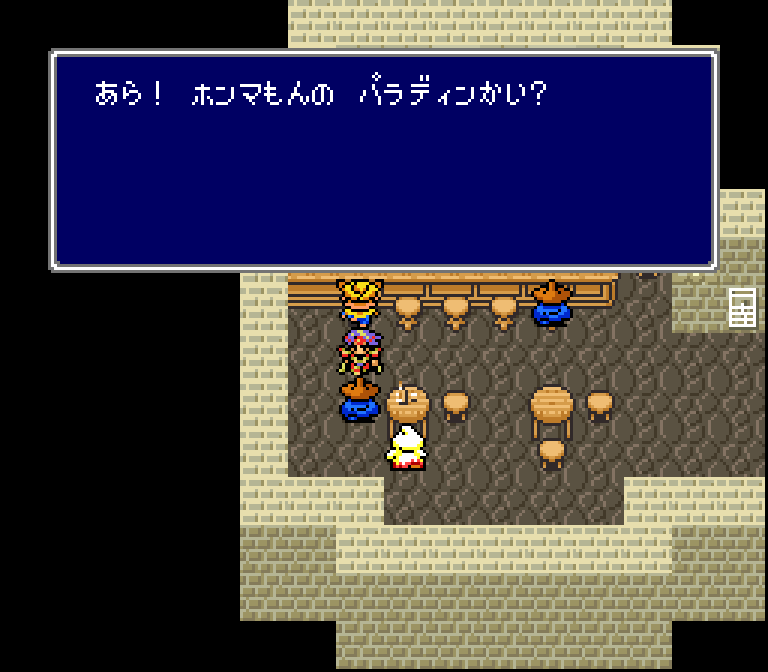 | 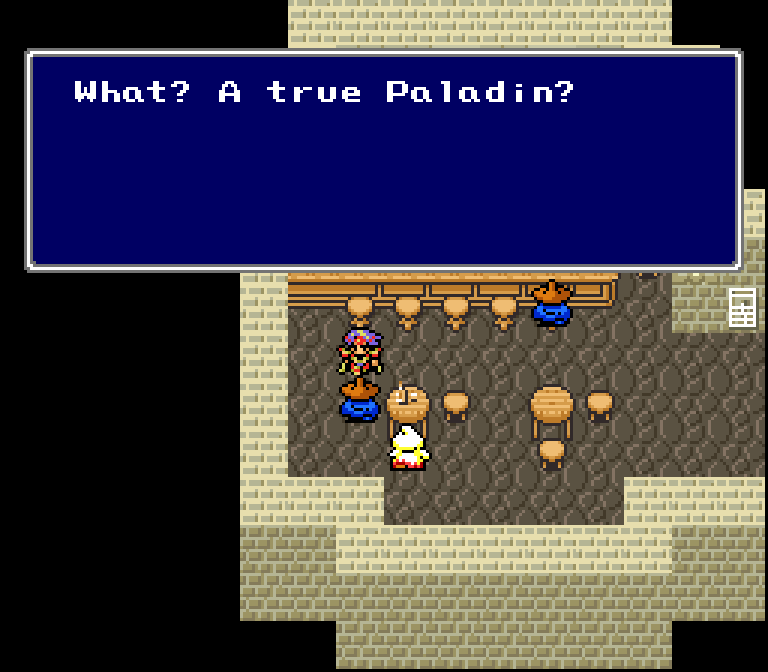 |
| Final Fantasy IV (Super Famicom) | Final Fantasy II (Super NES) |
After you’ve returned, this black wizard says something like this in Japanese: “Oh! You a jen-yoo-ine Paladin?”
He’s actually speaking in a bit of a dialect here in Japanese. It’s always hard to convey dialects in translation, the one I’ve provided above is just one attempt. I’m not actually sure I’d have translated it that way in a professional setting, “jen-yoo-ine” is too easy to not understand in writing to mean “genuine”. Sometimes that happens in translation – something that’s obvious when you hear it isn’t so obvious in writing.
Anyway, the point I want to bring up here is that the English translation made no attempt at all to pass along the dialect aspect of this line: “What? A true Paladin?”
Impressed Wizard
The black wizard on the far left side of the House of Prayers/Wishes has a new thing to say:
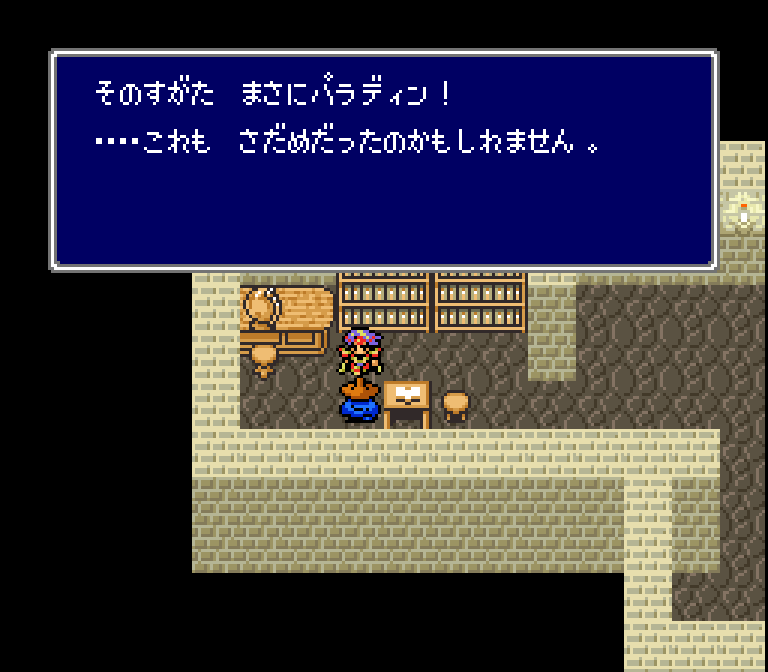 | 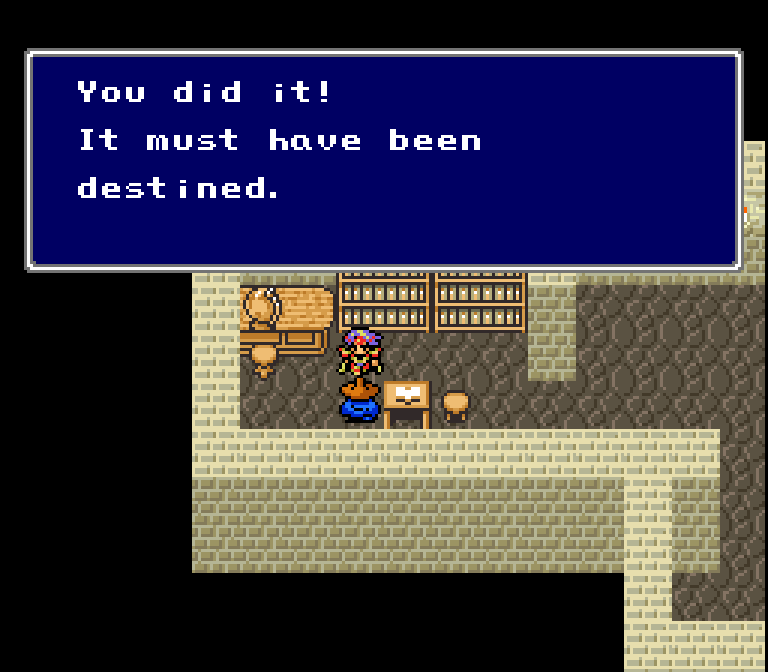 |
| Final Fantasy IV (Super Famicom) | Final Fantasy II (Super NES) |
| Japanese Version (basic translation) | English Version |
| Your appearance… You truly are a Paladin! …Perhaps this, too, was destiny. | You did it! It must have been destined. |
The Japanese line could be translated in a few different ways too, but for me, the choice to translate it as “You did it!” seems a little out of character for this guy who was spouting philosophy just a short while earlier. He speaks in a more “educated” tone in Japanese, at least.
Returning to the Elder
The elder has a lot to say now that Cecil’s a Paladin:
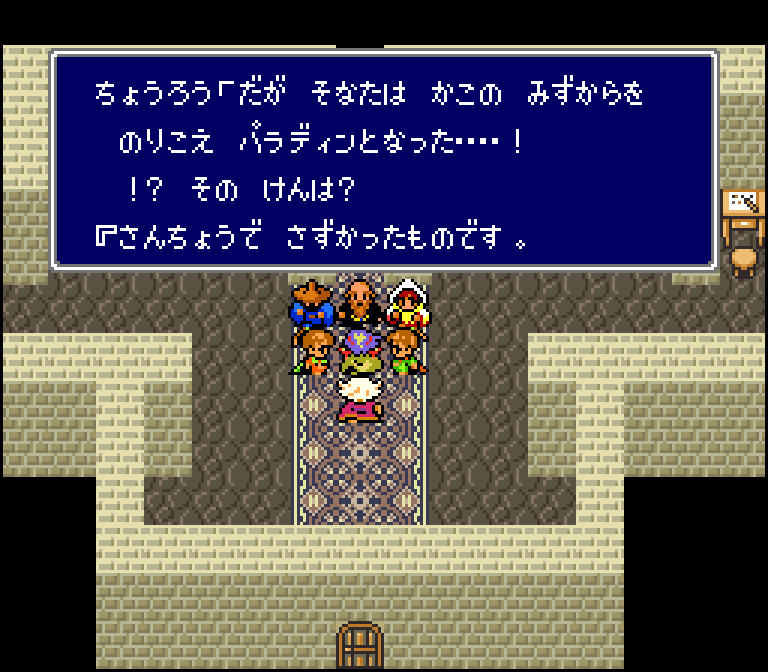 | 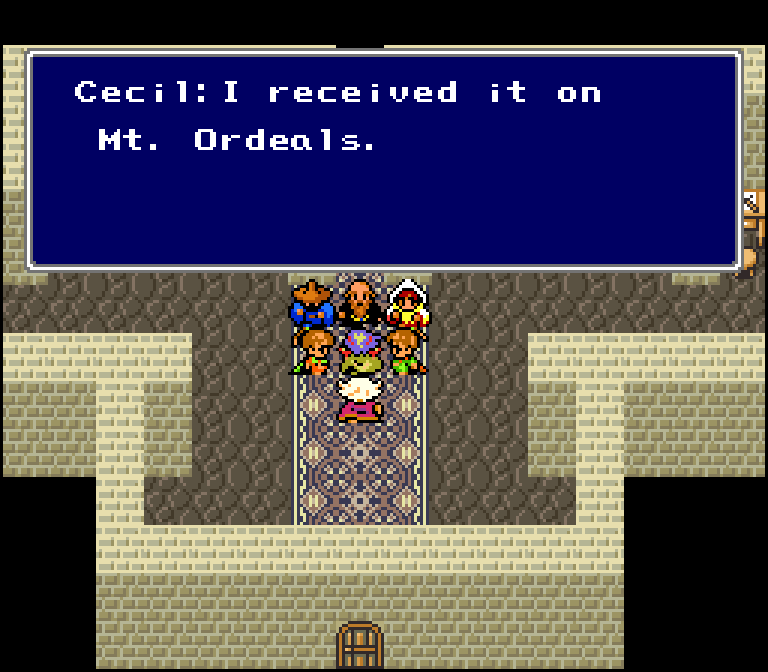 |
| Final Fantasy IV (Super Famicom) | Final Fantasy II (Super NES) |
| Japanese Version (basic translation) | English Version |
| Elder: Oh! Your appearance! | Elder: Oh! You really became…! |
| Porom: He’s just as you can see! | Porom: Here you are! |
| Palom: I never would’ve believed it myself! | Palom: Man! Unbelievable! |
| Cecil: What are you talking about? | Cecil: What about? |
| Elder: I felt bad doing so, but I ordered these two to keep an eye on you. | Elder: I felt guilty, but I had them spy on you. |
| Although it seems there was no such need after all. | But it turned out that there was no need for it. |
| Well done, Palom and Porom! | |
| Palom: Yeah, that’s pretty much it. | Palom: That is the reason why we accompanied you. |
| Porom: I’m sorry for hiding the truth from you. But we had no other choice. | Porom: I’m sorry I didn’t tell you. |
| Cecil: No, it’s only natural, given all that I had done… | Cecil: I do understand. You did the right thing. I deserve it. |
| Elder: But you’ve overcome your past self and become a Paladin…! | Elder: But you’ve overcome your past and became the Paladin! |
| !? That sword…? | …!? That… sword?! |
| Cecil: I received it on the summit. | Cecil: I received it on Mt. Ordeals. |
| Elder: My word! | |
| The inscription on this is the exact same as the legend passed down in Mysidia since antiquity! | Elder: The inscription upon this sword is exactly the same as the Mysidian Legend! |
| Cecil: Legend? | Cecil: Legend? |
At first glance, there’s not much to say here, but let’s dig a little deeper:
- Cecil’s confusion makes more sense in the Japanese exchange at the beginning. In the English text, he’s less confused and just not really sure what Palom is calling “unbelievable”.
- The line where the elder thanks Palom and Porom is missing from the English translation.
- The English translation has Palom saying, “That is the reason why we accompanied you.” This is in stark contrast to his speaking style as seen in the Japanese text and in most of the rest of the English translation. It almost makes me think the translator accidentally wrote this line thinking it was meant for Porom.
- Cecil says, “You did the right thing. I deserve it.” in the English translation, but this feels quite a bit stronger than what was originally intended. In the end, it doesn’t make much of a difference and is probably more of a matter of opinion than anything.
- In English, Cecil says he received the sword on Mt. Ordeals, but in the original text he simply says he received it on the summit. Someone on the localization team must’ve felt it was better to clarify things for English translation players.
- In the English text we see another instance of “!?” followed by “?!”. Again, this seems to be an artifact of someone else going in and changing bits and pieces after the first draft of the translation.
While we’re here, there are a couple lines here that have differences between the original Japanese version and the Easy Type version. First is this:
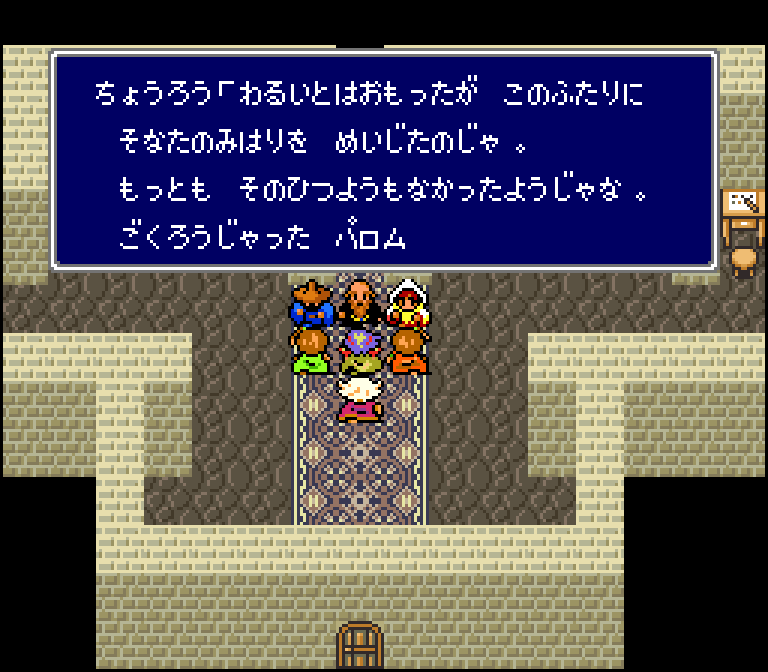 | 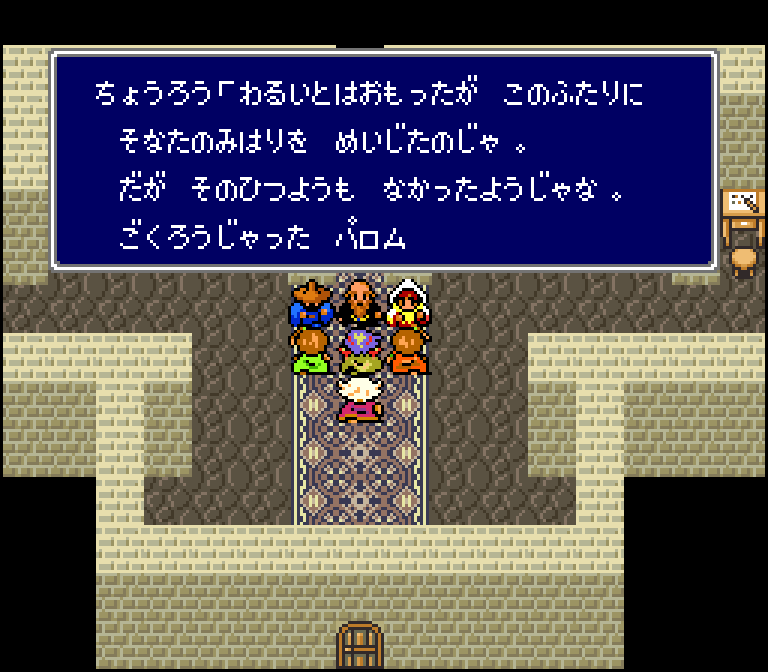 |
| Final Fantasy IV (Super Famicom) | Final Fantasy IV Easy Type (Super Famicom) |
| FFIV (basic translation) | FFIV Easy Type (basic translation) |
| Although it seems there was no such need after all. | But it seems there was no such need after all. |
And one other tiny change happened between Final Fantasy IV and Final Fantasy IV Easy Type:
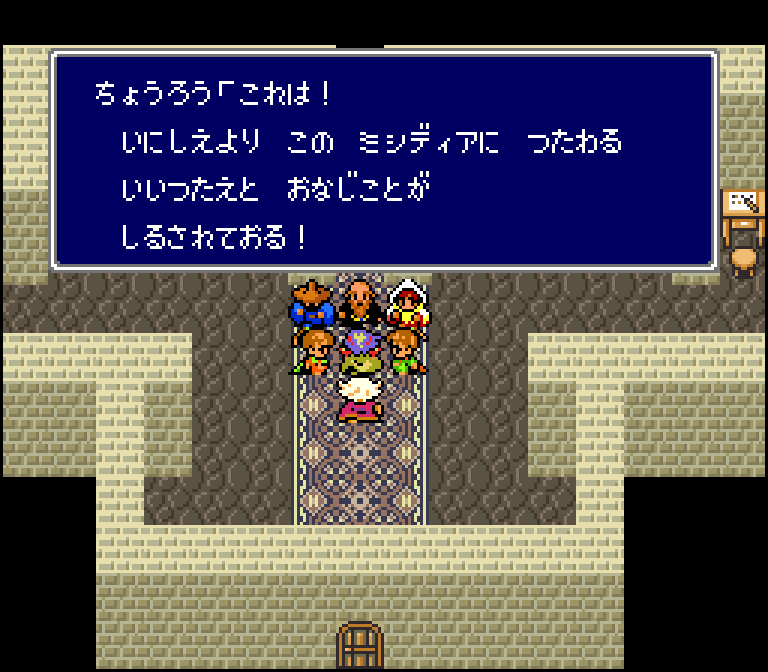 | 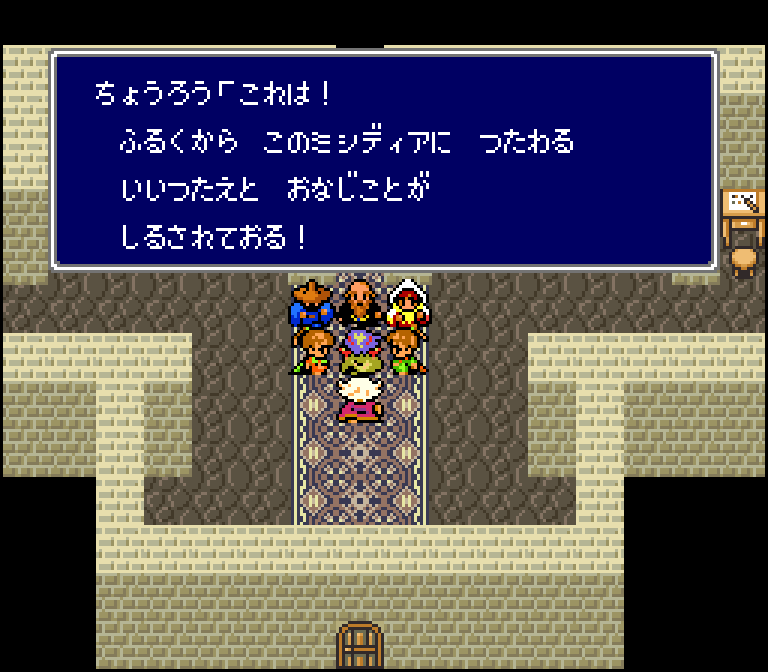 |
| Final Fantasy IV (Super Famicom) | Final Fantasy IV Easy Type (Super Famicom) |
| FFIV (basic translation) | FFIV Easy Type (basic translation) |
| The inscription on this is the exact same as the legend passed down in Mysidia since antiquity! | The inscription on this is the exact same as the legend passed down in Mysidia since long ago! |
Basically, these are some simple word changes meant to make the text more understandable for younger audiences. It’s hard to bring this across in translation, but the Easy Type text is indeed a tiny bit easier to understand.
Mysidian Legend
At this point, the text of an ancient legend appears on the screen much like in previous Final Fantasy games. Since this is obviously an important piece of text in the game, let’s check it out:
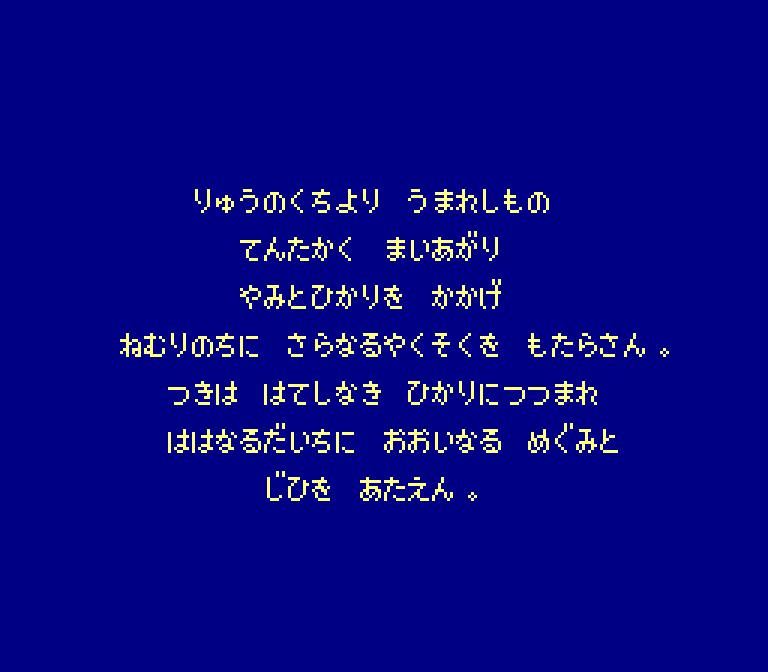 | 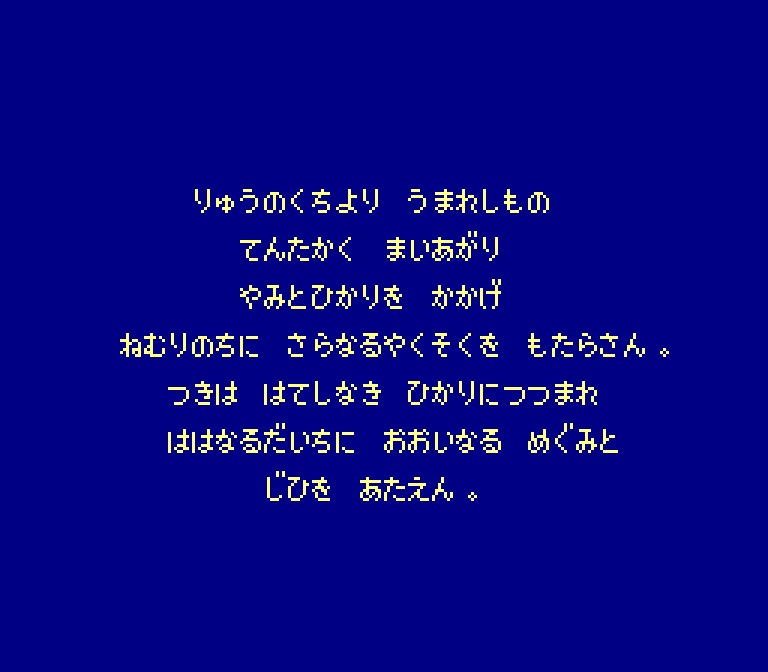 | 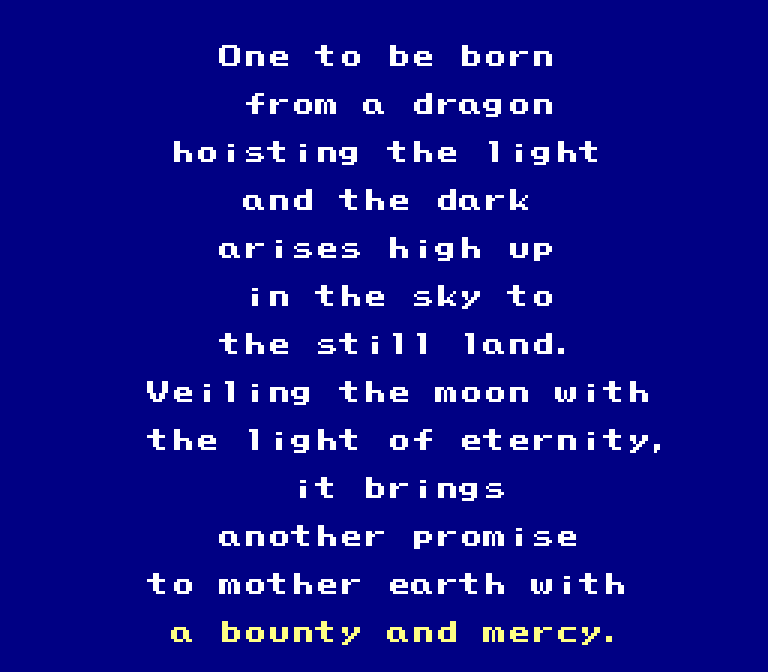 |
| Final Fantasy IV (Original) | Final Fantasy IV (Easy Type) | Final Fantasy II (Super NES) |
| Japanese Version (basic translation) | English Version |
| One born from the mouth of a dragon shall soar high into the heavens, and, hoisting the dark and light, bring forth a greater promise unto the land of slumber. | One to be born from a dragon, hoisting the light and the dark arises high up in the sky to the still land. |
| The moon, veiled in everlasting light, bestows a great bounty and mercy to the mother earth. | Veiling the moon with the light of eternity, it brings another promise to mother earth with a bounty and mercy. |
The thing about old legends and stuff like that is that they’re often more difficult to translate than regular text and are usually more open to interpretation.
For reference, the Japanese text here does use some bits of classical Japanese – that is, really old Japanese from hundreds of years ago. So some of it might be inaccessible if you’re just starting to learn the language. In many cases I’ve seen inexperienced translators tripped up by classical Japanese in ways that often mean the exact opposite of what was intended. It’s good to see that that didn’t happen with the official English translation. I guess it makes sense, since native Japanese translators were behind the translation.

Anyway, probably the really big thing to point out here is that the English translation says “born from a dragon” while the Japanese text is more specific and says “born from the mouth of a dragon”. This seems to be a sticking point for some fans – unfortunately, it was never corrected until the DS version some 17 years later. In any case, the Japanese text makes it more clear that it’s referring to the area around Mysidia, which looks like a dragon. The moon ship comes out of the mouth area late in the game during events tied directly to this legend.
Also of interest is the phrase “land of slumber”, which could also be taken as “sleeping land” or “land that lies dormant”. It seems clear to me that it’s referring to the second moon here, which we learn is where the Lunarians have been sleeping for a long time.
A couple other things to point out:
- The text is slightly yellow in both Japanese versions of the game, while it’s white in the English localization.
- After the text is fully displayed in the Japanese version, there’s a bit of a pause before it goes back to the main game. This pause is likely there for slower readers to catch up in time. Or possibly just for dramatic effect. In contrast, there’s almost no pause after all the English text appears – it goes back to the main game almost immediately after the last line displays. This always felt slightly unprofessional to me for whatever reason.
Incidentally, the DS localization uses its flowery style to make something that sounds more legend-like:
Birthed from womb of Dragon’s maw
And borne unto the stars
By light and darkness cast aloft
Are dreamtide oaths resworn
Moon is swathed in ever-light
Ne’er again to know eclipse
Earth, with hallow’d bounty reconciled
My personal opinion is that Final Fantasy localizations from around XII and on try a little too hard to achieve this sort of tone, but I can certainly appreciate the reasoning for it and especially the hard work that goes into this sort of thing. I really do prefer the simpler translations of text that is already pretty simple in Japanese to begin with, but then again this might just be because I grew up with the simpler translations.
Whatever the case, my hat goes off to the DS localizers – I don’t think I’d have anywhere near the ability to write something like that in English!
Elder Assistance
After the legend pops up and disappears, it’s time for more talk with the elder and pals:
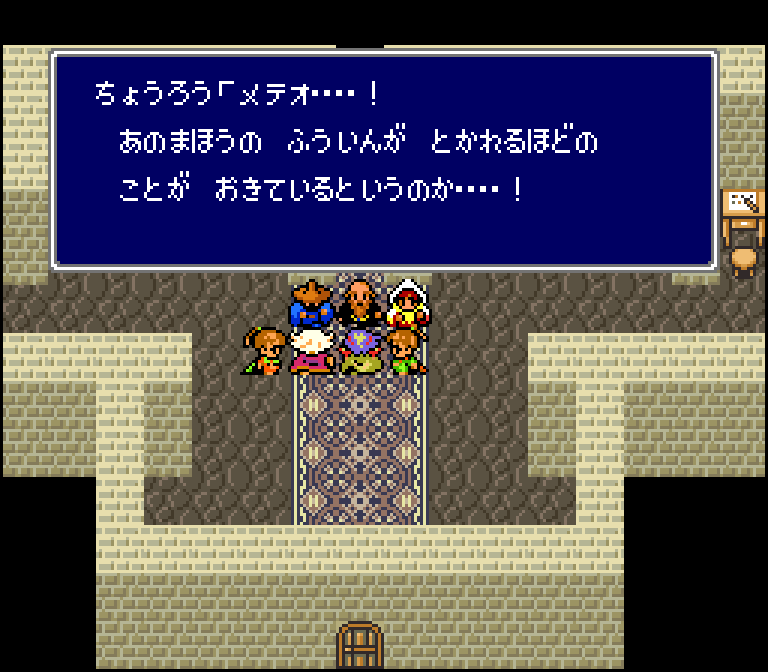 | 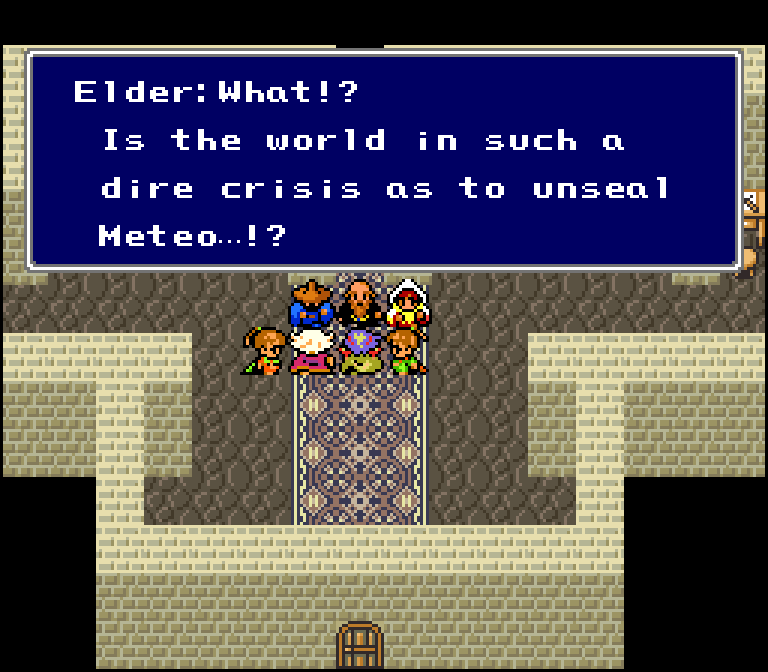 |
| Final Fantasy IV (Super Famicom) | Final Fantasy II (Super NES) |
| Japanese Version (basic translation) | English Version |
| Cecil: …That light called me its son. | Cecil: The Light called me son. |
| Just what is that light? | What is that Light? |
| Elder: Not even I know what the light on Mt. Ordeals is or what this legend means… | Elder: I do not know what it is nor do I know what the legend means… |
| We Mysidians are simply told from generation to generation to pray for this legend. | But we Mysidians, from generation to generation, are told to wish for this legend. |
| And to believe in the one with a sacred glimmer… | And to believe in the one with the Sacred Light. |
| That person may very well be you! | Now I am sure that you are the one! |
| Tella: Now we must hurry and vanquish Golbez at once! | Tellah: Now we must get rid of Golbez in a hurry! |
| Elder: Oh, Tella! | Elder: Oh, Tellah! |
| Tella: It’s been a long time. | Tellah: It’s been a while! |
| Porom: We met him on Mt. Ordeals. | Porom: We have met him on the Mt. Ordeals. |
| Palom: This old dude’s obtained Meteo! | Palom: This old man knows the legendary Meteo! |
| Elder: Meteo…! | Elder: What!? |
| Have things become dire enough that that spell must be unsealed…!? | Is the world in such a dire crisis as to unseal Meteo…!? |
| Tella: It seems so. | Tellah: It seems so. |
| Now I can avenge Anna! | I’ll avenge Anna with my Meteo! |
| Elder: Anna is…? | Elder: Avenge!? You mean… |
| Tella: Golbeza did her in! | Tellah: Golbez took my daughter’s life! |
| I WILL defeat him with Meteo! | I will make him pay for it with Meteo! |
| Elder: Tella. You will destroy yourself if you fight with hatred! | Elder: Do not fight with vengeance, Tellah. |
| What’s more, Meteo is too dangerous for you to use as you are now! | Moreover, you are in no condition to use Meteo! |
| Tella: Even if it destroys me, I WILL make him pay! | Tellah: Even if the price is my life, I can’t forgive Golbez! |
There are a few small points of interest here, so let’s take a look:
- It’s amusing how the English translation keeps translating it as “Light” even in places where it wouldn’t be a proper noun. It adds a bit of non-native flavor to the writing, but is otherwise harmless.
- Unsurprisingly, the references to praying are changed to wishing again.
- The elder is much more certain that the legend is speaking about Cecil in the English text. He’s not really doubtful in the Japanese text, but it has the sense of “perhaps” or “maybe” to it rather than the “I am sure!” phrasing the English translation uses.
- Palom reveals in the Japanese text that Tellah has “obtained” Meteo. In the English text, he says that Tellah “knows” Meteo. It’s just a slight difference, but the original text gives it a nuance that it was something that you would need to go out of your way to obtain. Which makes sense, since it was apparently sealed away.
- Until now, the English translation wrote around or left out the fact that the Meteo spell had been sealed away. But the mention here is suddenly left intact, which is interesting.
- I really like the “Avenge!? You mean…” translation. It really gets to the nuance of the original text but doesn’t adhere to the original words.
- It’s common for Japanese games, anime, manga, and stuff to try to avoid the word “korosu”, which means “to kill”. Instead, the usual go-to word is “yaru”, which can often be translated in such contexts as “to do in”. I bring this up because I like the way the English translation sort of did its own thing to achieve the same general meaning… while still avoiding the word “kill”.
- The English translation says that Tellah shouldn’t fight with “vengeance”, but it really is much more like “hatred” in the original text. I can’t help but feel that this adds to the parallels the game has with Star Wars and the light and dark sides of the Force.
Whew! The elder won’t stop talking:
 | 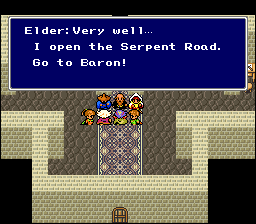 |
| Final Fantasy IV (Super Famicom) | Final Fantasy II (Super NES) |
| Japanese Version (basic translation) | English Version |
| Elder: I thought you would say that. I see you’re still the same as in the old days. | Elder: I thought you’d say so. You haven’t changed. |
| Tella: As are you… | Tellah: You too… |
| Elder: However, Sir Cecil has become a Paladin. If you two were to join forces…! | Elder: But Cecil has become a Paladin. If you join forces… |
| Cecil: But we’ll need to return to Baron and obtain an airship if we’re to stand up to Golbeza… | Cecil: We must go back to Baron and get the airship to fight Golbez on equal terms… |
| Elder: Very well… I shall unseal the Devil Road! | Elder: Very well… I open the Serpent Road. |
| Now that you are a Paladin, you should be able to travel through the Devil Road! | |
| Go forth, to Baron! | Go to Baron! |
| I will enter the Tower of Prayers and continue to pray for you all… | I will confine myself in the Tower of Wishes and wish for you all… |
| We’re counting on you…! | |
| Sir Cecil the Paladin! | Paladin Cecil! |
| Cecil: Right! |
For the most part, this translation is okay. The only things that stand out are the usual “prayers” to “wishes” stuff and the “Devil Road” to “Serpent Road” stuff. But we also see that a few lines have been left out, including a response by Cecil to the elder.
At this point, Palom and Porom decide they want to stick with Cecil:
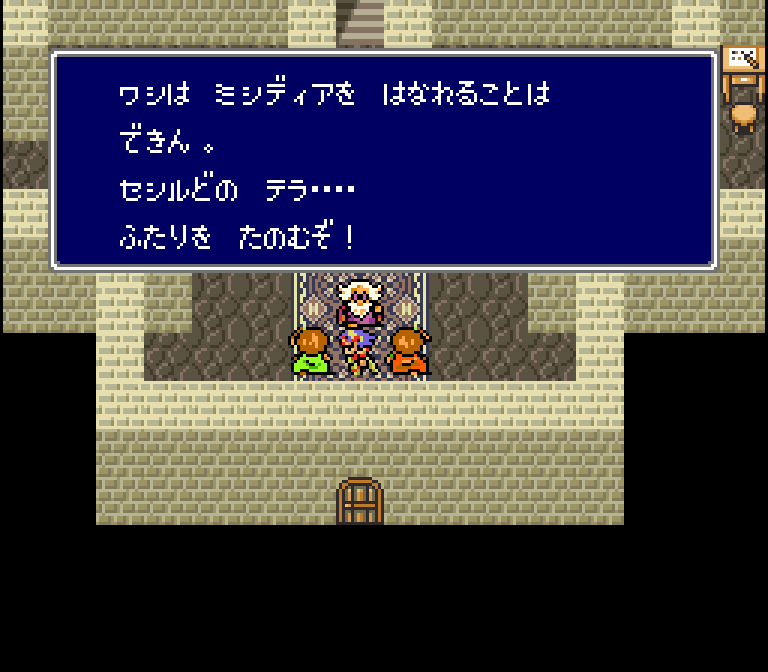 | 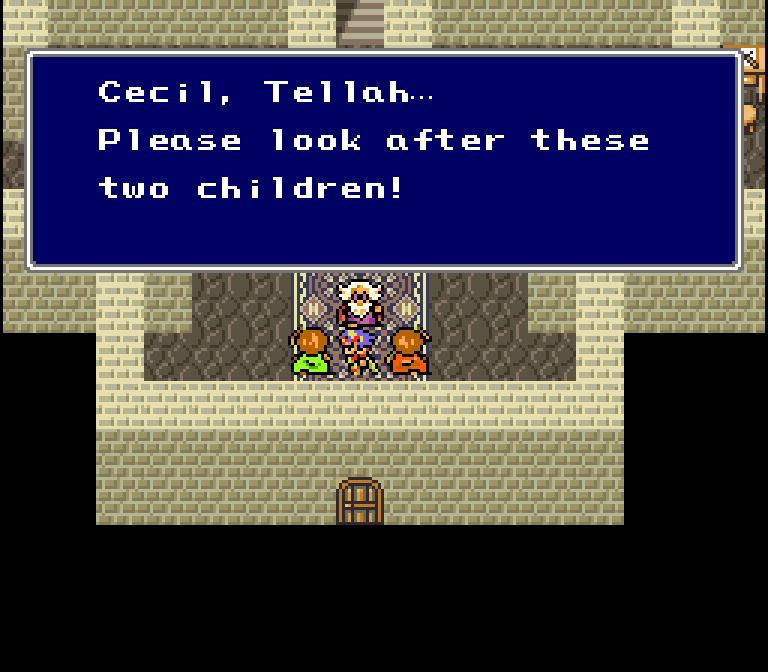 |
| Final Fantasy IV (Super Famicom) | Final Fantasy II (Super NES) |
| Japanese Version (basic translation) | English Version |
| Elder: Palom! Porom! Your duties are over! | Elder: Palom! Porom! You have completed your duty! |
| Palom: They ain’t over at all! You told us yourself to help this guy out, Elder! | Palom: It’s not over yet! You told us to help him! |
| Porom: Please allow us! | Porom: Please allow us to go with him! |
| Elder: You two… The fact that Mt. Ordeals accepted you could perhaps mean this is your destiny as well… | Elder: …The Mt. Ordeals accepted you and returned you alive…… Thus this may be your destiny. |
| I cannot leave Mysidia. | |
| Sir Cecil. Tella… Please take care of these two! | Cecil, Tellah… Please look after these two children! |
| Cecil: But… | Cecil: But:… |
| Palom: You know what we’re capable of! | Palom: You know what we can do, don’t you? |
| Porom: Precisely! | Porom: Right! |
| Tella: Worry not. I will be with you as well! | Tellah: Never worry. I am with you! |
| Cecil: All right… I’m counting on you! | Cecil: Okay… I’m counting on you all! |
Here, we see that a line was removed from the translation. Also, some of the normally odd, non-native English phrasing is missing as well. Things like “Never worry” and “Thus this may be your destiny” sound like something a native English speaker would know but that a non-native speaker wouldn’t use. But then it says “the Mt. Ordeals” in there, so I dunno anymore.
What’s particularly interesting is that the English translation suggests that the elder didn’t expect the kids to return from Mt. Ordeals alive. This implication isn’t in the Japanese text at all.
And now this long scene wraps up:
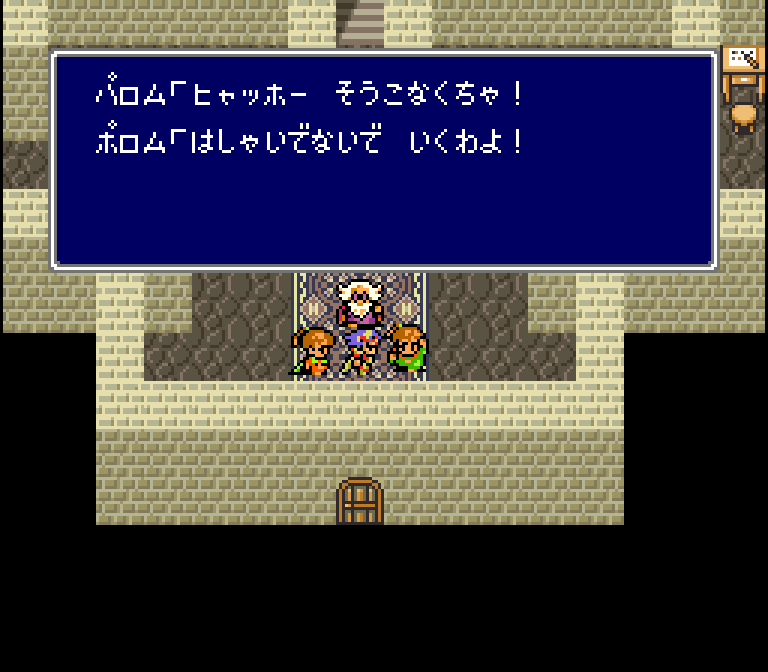 | 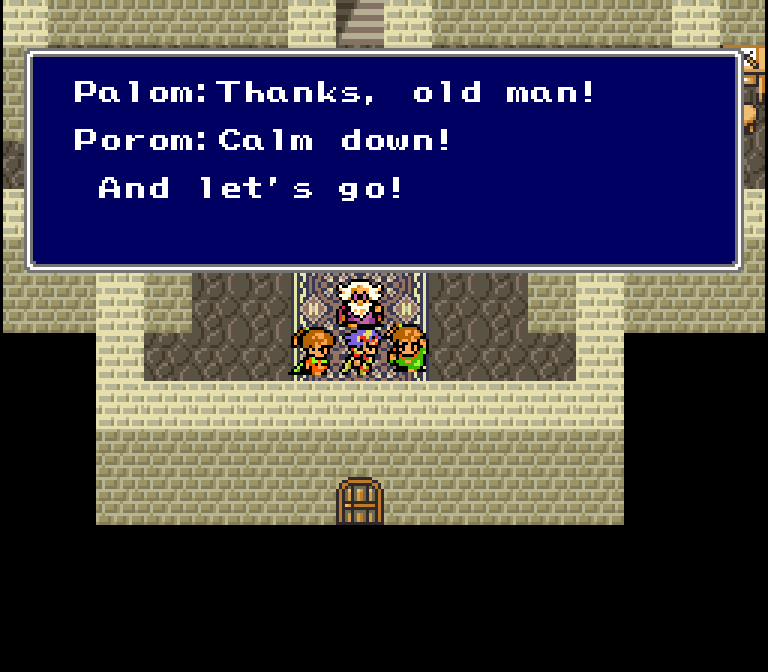 |
| Final Fantasy IV (Super Famicom) | Final Fantasy II (Super NES) |
| Japanese Version (basic translation) | English Version |
| Palom: Yahoo! Now that’s more like it! | Palom: Thanks, old man! |
| Porom: Calm down! And let’s go! | Porom: Calm down! And let’s go! |
| Elder: Now, then! Use the Devil Road on the right side of town to head to Baron! | Elder: Now go to Baron through the Serpent Road to the right of this town. |
| I shall continue to pray in the tower above for you… no, for all living things! | We will be wishing for not only you but for all those living on this earth! |
| We’re counting on you…! |
Although just a small bit of text, there are a few points that immediately stand out:
- Palom thanks the elder in the translation, but doesn’t really do that in the original text at all.
- The elder states that he’ll be in the tower above in the Japanese version, but not in the English text. I remember wondering where he went when I first played the English translation – I didn’t realize that there was more than just the crystal room above.
- In the Japanese text, he says “I shall continue to pray”. But in the English translation he says, “We will be wishing”.
- In the English translation he says “on this earth”. This isn’t in the original text, but “earth” is also a dangerous word to use when translating fictional stuff. It can often give the unintended implication that there’s a connection to our real-life Earth. The same danger occurs when using other words too, like “God”. I think in this case it’s not a huge problem, since there are legimitate implications elsewhere in the Japanese script that point to this taking place on actual Earth.
- I feel like the English translation’s “for all those living on this earth” gives it a more “for all people” nuance, while the original Japanese text seems to refer more to all living creatures in general.
- The elder’s parting line was left out of the English translation.
Elder Reminder
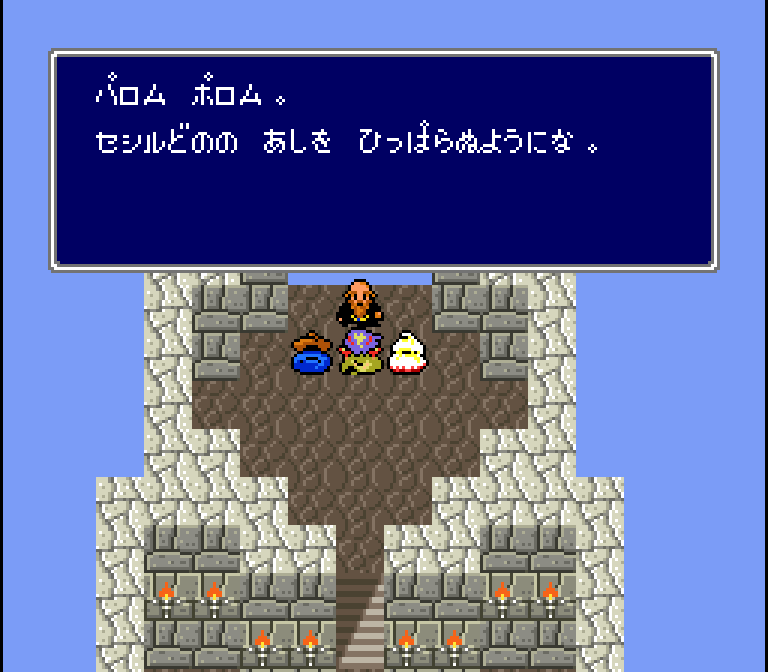 | 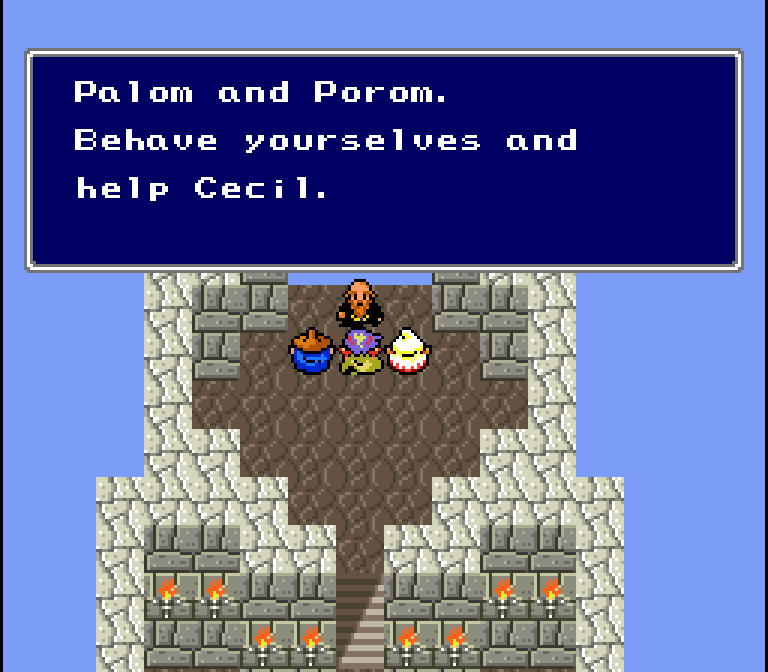 |
| Final Fantasy IV (Super Famicom) | Final Fantasy II (Super NES) |
If you talk to the elder at the top of the tower now, he’ll say some stuff and then say in Japanese: “Palom. Porom. Try not to get in Sir Cecil’s way, okay?”
In English, this changed very slightly to become, “Palom and Porom. Behave yourselves and help Cecil.”
Serpent Road / Devil Road
Since we’re here, let’s take a look at the Devil/Serpent Road on this side of the pond:
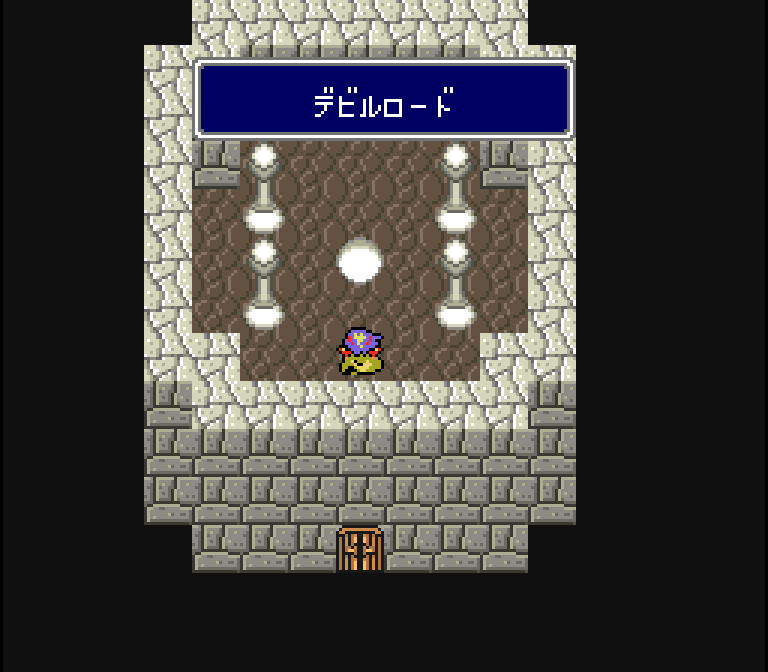 | 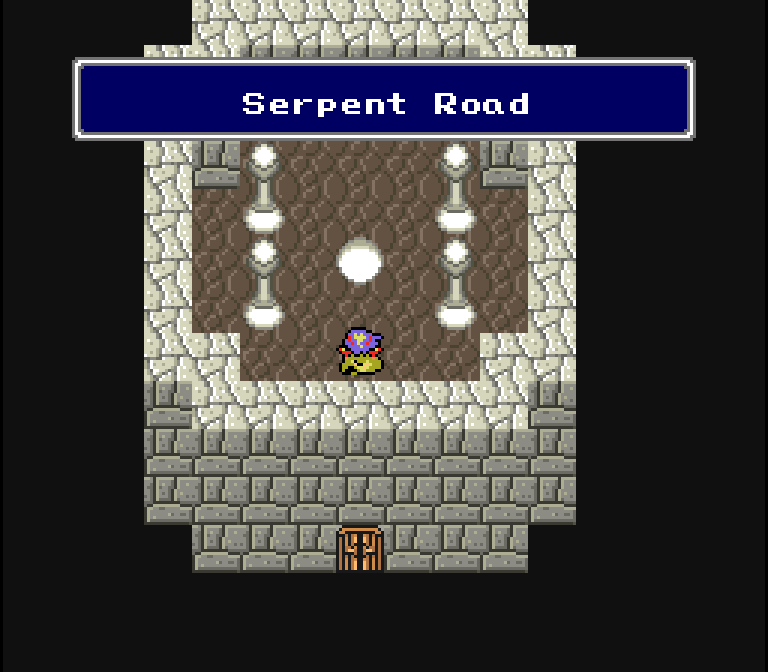 |
| Final Fantasy IV (Super Famicom) | Final Fantasy II (Super NES) |
Yep, on the left it says “Devil Road” and on the right it says “Serpent Road”. Sometimes it’s easy to be inconsistent with changes like this, but whoever did this bit of censoring did a pretty thorough job!


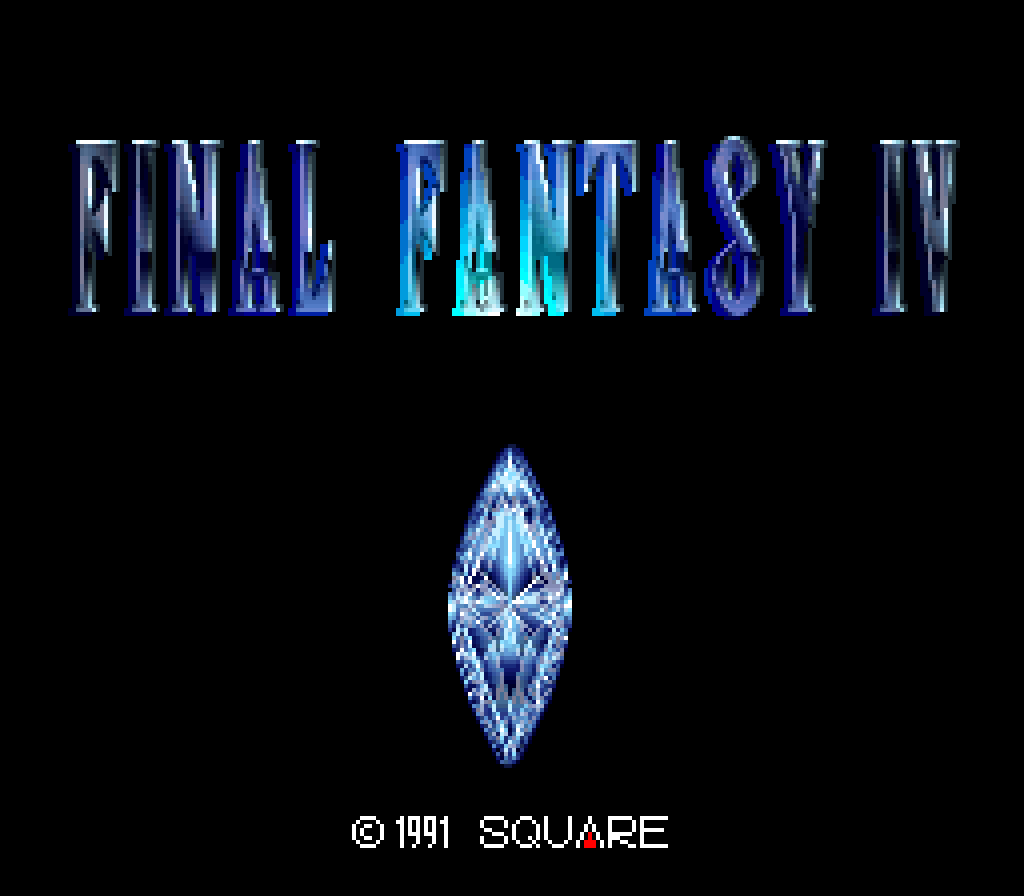
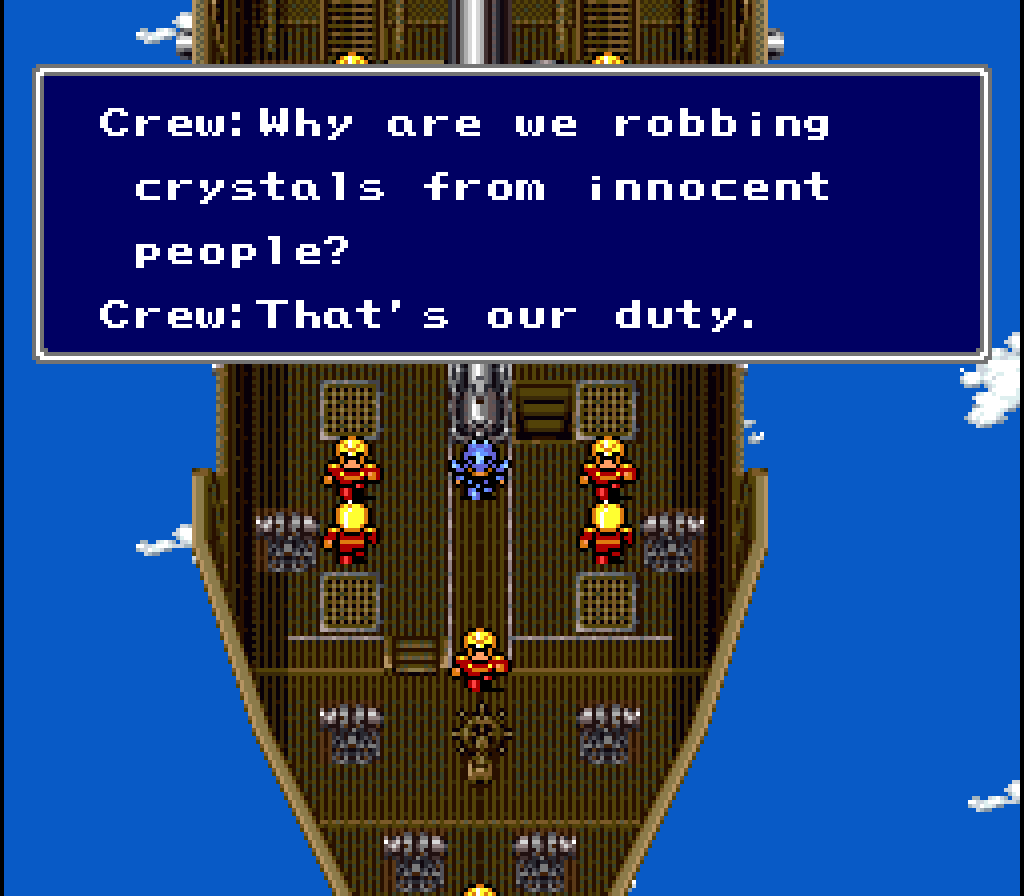
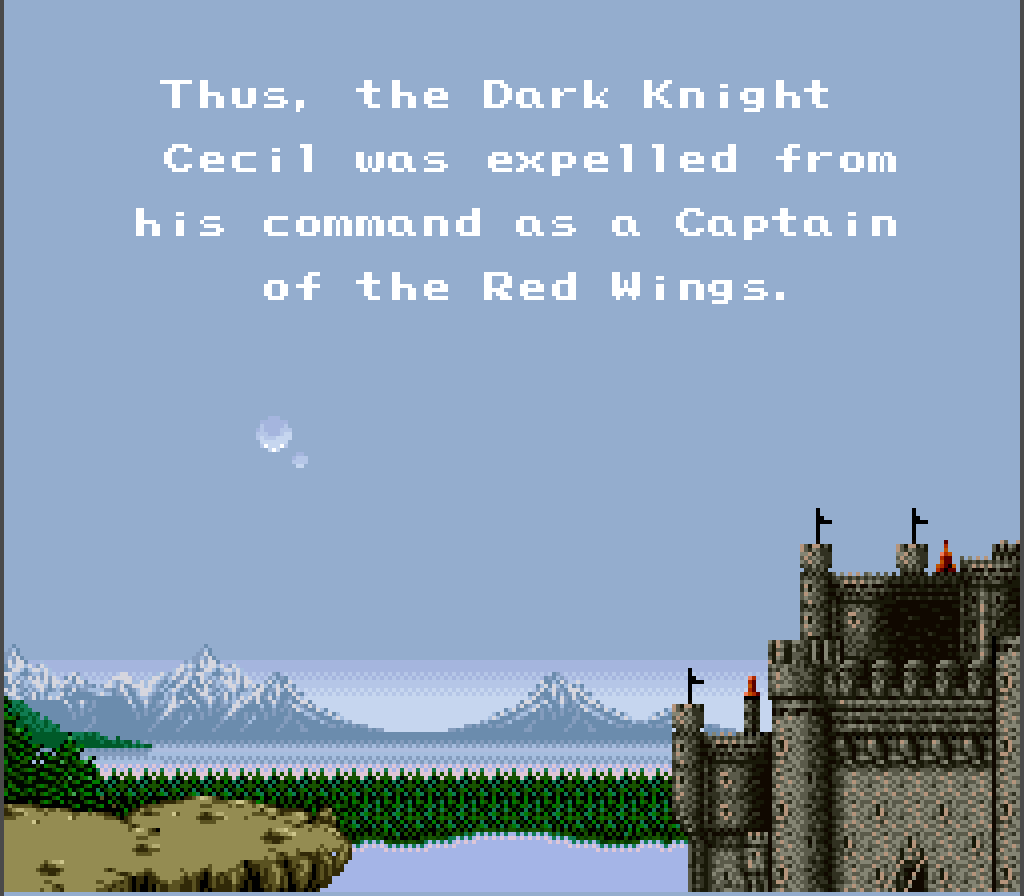
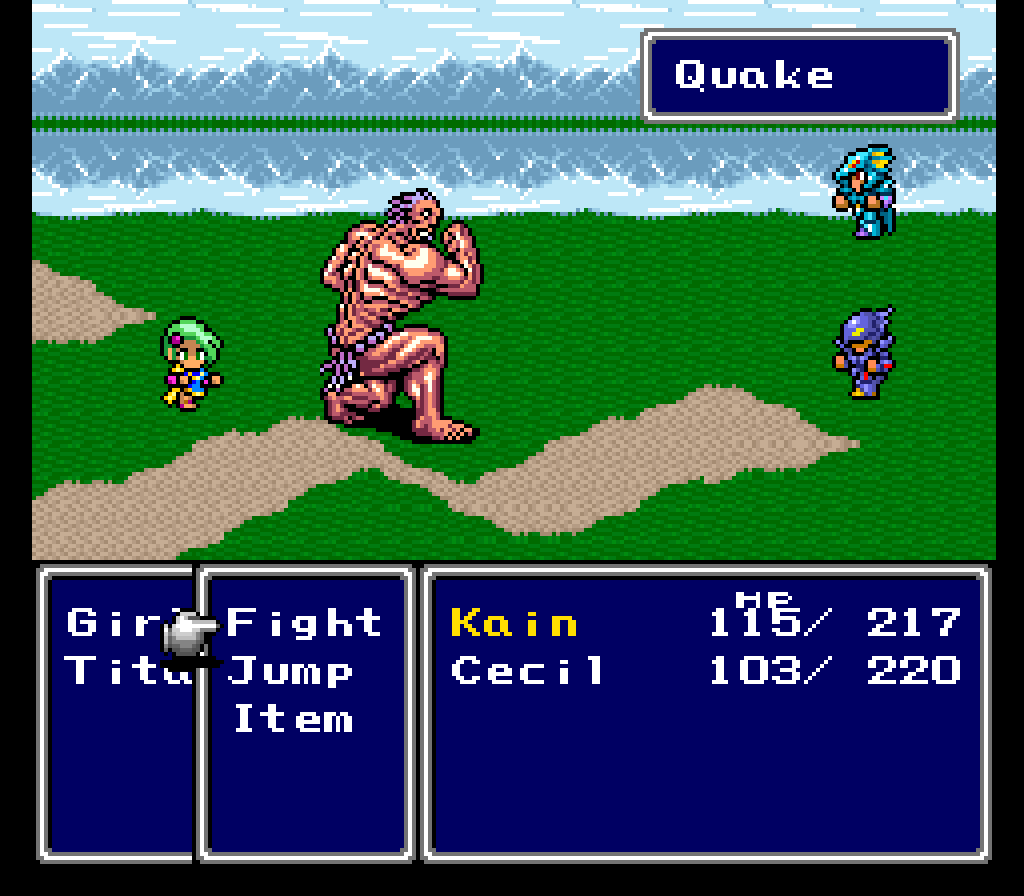
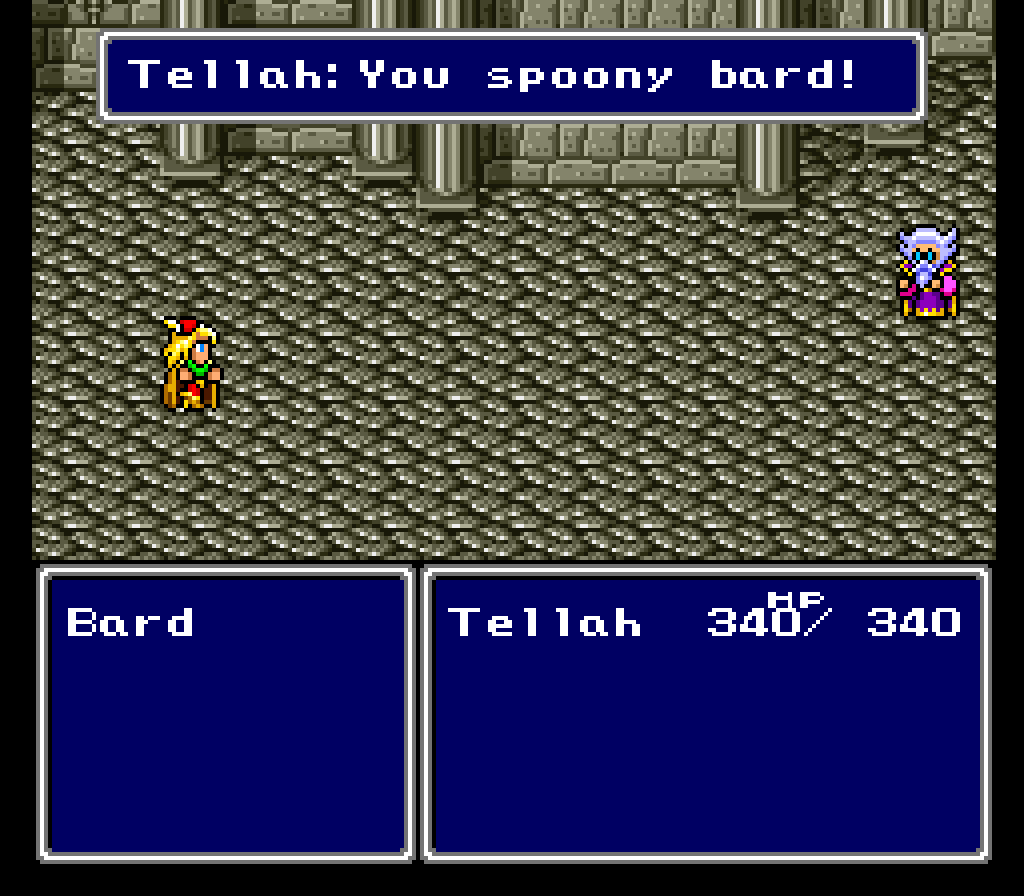
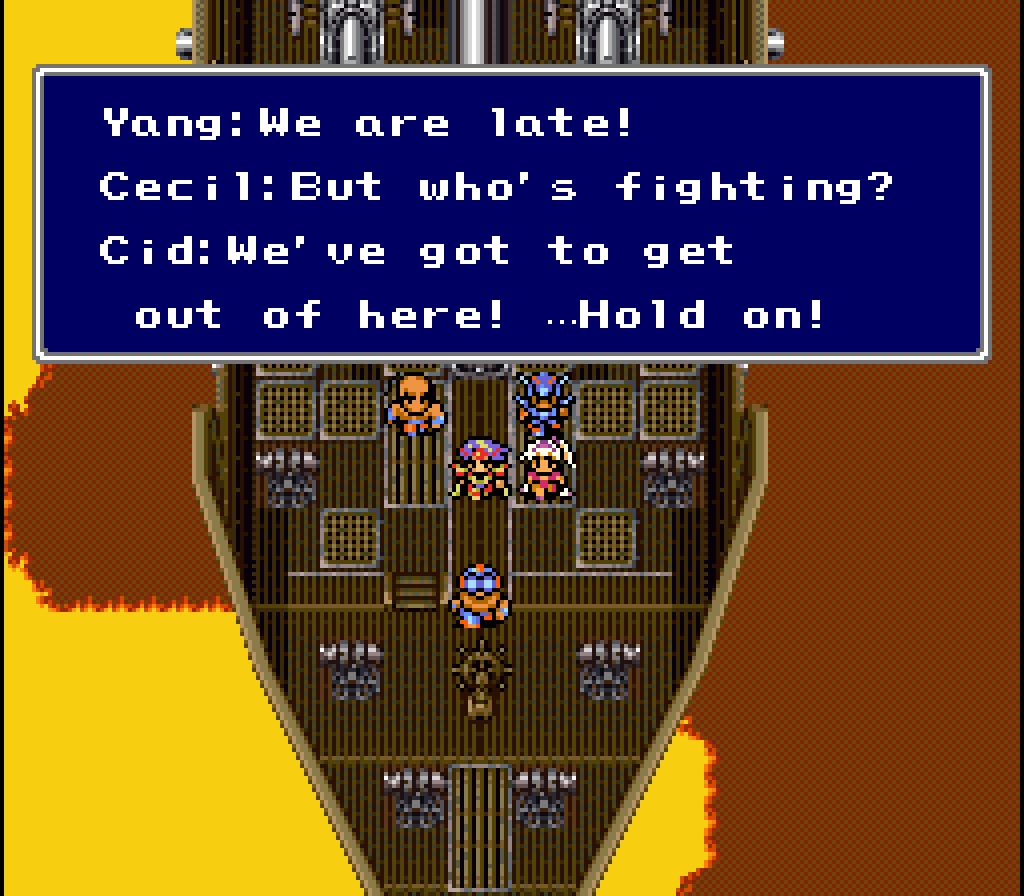
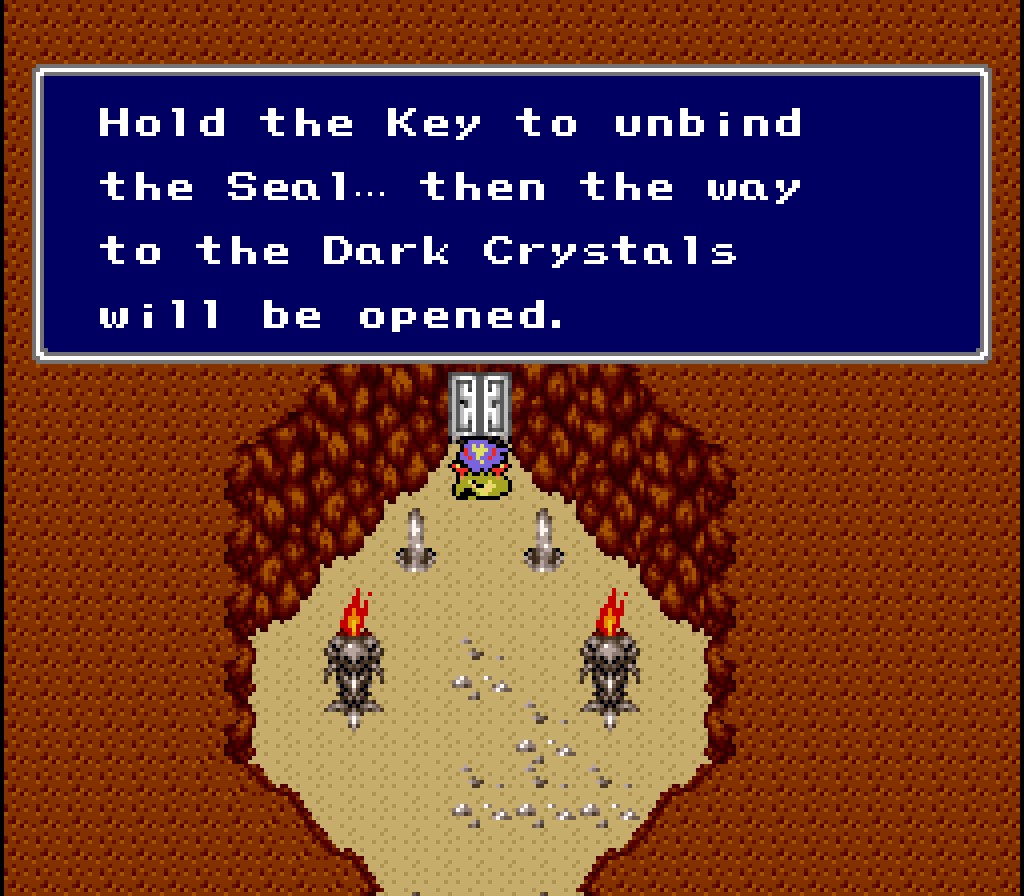
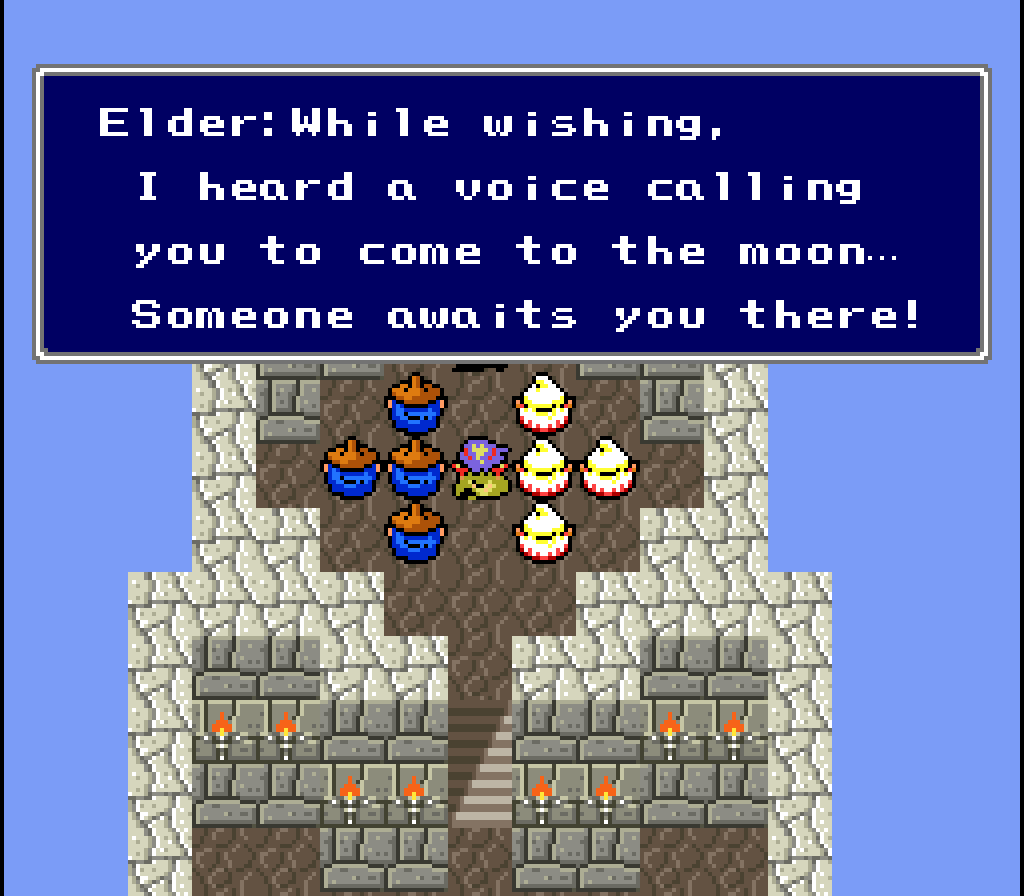
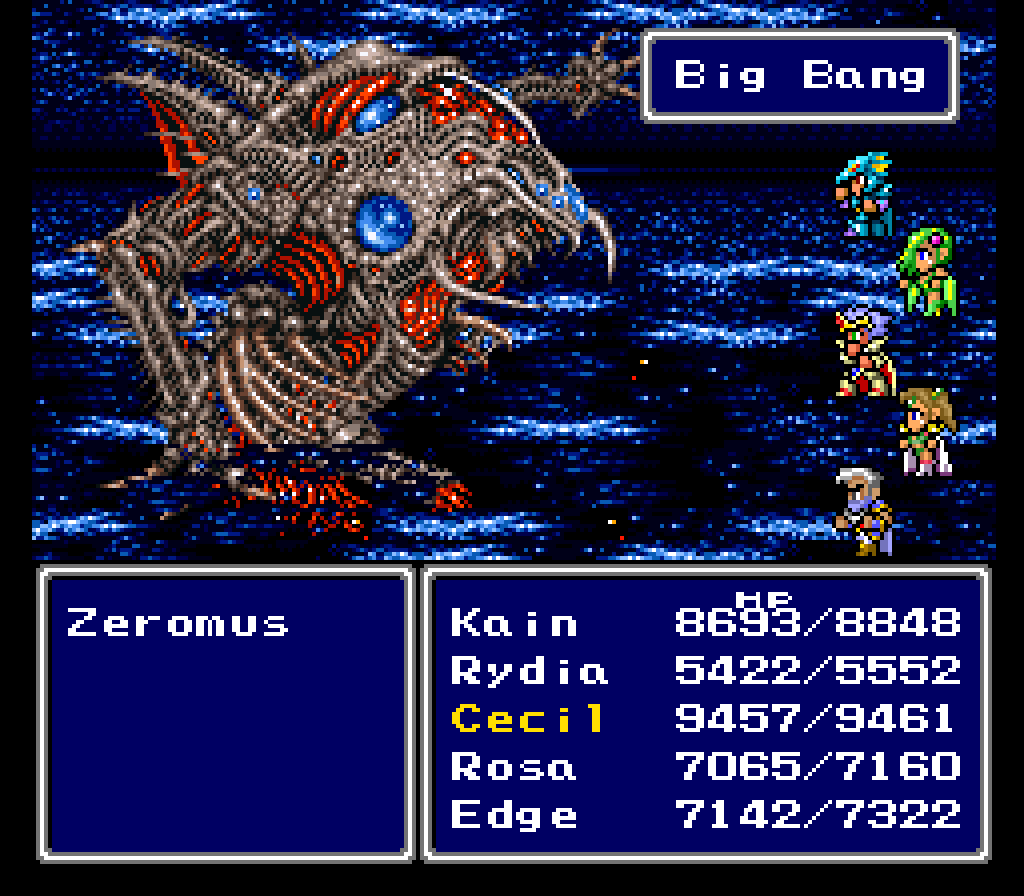
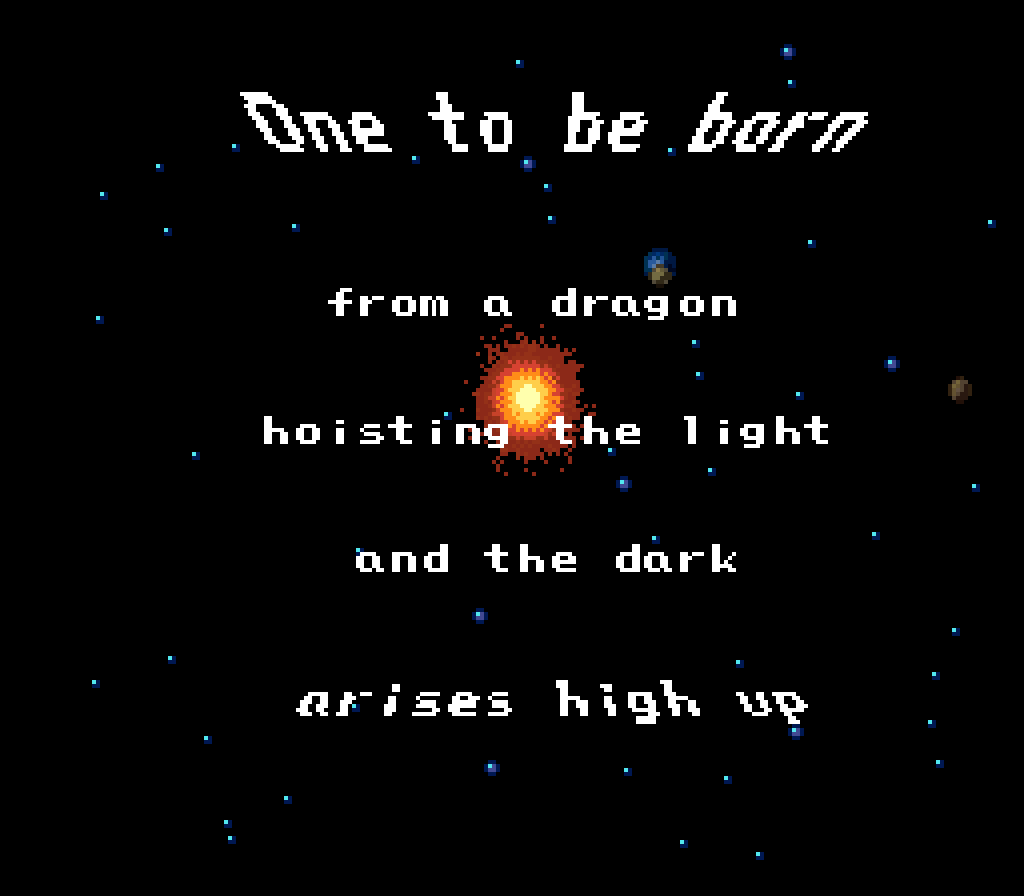
![press start to translate [Final Fantasy IV] press start to translate [Final Fantasy IV]](https://legendsoflocalization.com/wp-content/uploads/2019/08/bbenma.png)
No Comments